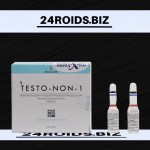T3-MAX-100 Liothyronine, or T3 (L-triiodothyronine) is one of the thyroid hormones, synthesized and secreted by the thyroid gland. T3 contains three iodine atoms and is derived from peripheral monodeiodination of T4 (at the 5th position of iodothyronine nucleus); T3 is the main hormone delivered and used by the tissues. Thyroid hormones increase oxygen consumption by the majority of tissues throughout the body; both T3 and T4 increase the BMR (basal metabolic rate) and the metabolism of lipids, carbohydrates and proteins. Therefore thyroid hormones exhibit significant effects on every organ system and are crucial in the CNS development.
T3-MAX-100 (Liothyronine) is used mainly as a replacement or supplemental therapy in patients with hypothyroidism, except for transient hypothyrodism during the recovery phase of subacute thyroiditis.
T3 is a tyrosine-based hormone produced by the thyroid gland. Although the major form of thyroid hormone in the blood is thyroxine (T4), T4 is converted to the more active T3 form (liothyronine) by deiodinases in peripheral tissues. Thyroid hormones are essential for development and differentiation of all cells in human body; they regulate protein, fat, and carbohydrate metabolism, as well as how individual cells utilise energetic compounds. Thyroid hormone derivatives initiate their downstream effects through binding to nuclear thyroid hormone (TR) receptors. In a bound active state TR can regulate gene expression via direct interaction with DNA components. Various intercellular signalling pathways lead to direct effect on metabolism; T3 promotes an increase in BMR, protein synthesis, and sensitivity to catecholamines (e.g. adrenaline).
Cytomel should be taken orally, with or without food following the prescribed dosage regimen. It works best, when taken at the same time each day and for at least few weeks to relieve symptoms of a patient’s condition.
Cytomel should be taken 4 hours apart from calcium salts (like calcium carbonate), cholestyramine, or sucralfate. Double doses should not be taken at any time; in case of a missed dose – one should be taken as soon as possible unless, it is time for the next dose, in which case the missed dose should be skipped and regular dosing schedule followed.
Cytomel is contraindicated if: the patient is allergic to any ingredient in cytomel; in presence or a history of heart attack; presence of untreated thyrotoxicosis or uncorrected adrenal gland problems.
Medical assistance is required if any of the following apply:
Dose should be adjusted in case of any of the following: tremor, nervousness, insomnia, headaches, change in appetite, weight loss, diarrhoea, increased sweating or sensitivity to heat, increased heart rate, chest pain, and shortness of breath;
Concomitant treatment with blood thinners will require dosage adjustment in the blood thinner;
Diabetes. Cytomel may affect blood glucose levels;
Elderly patients may be more sensitive and should use cytomel with caution;
T3 may cause temporary hair loss in children;
T3 can be passed into breast milk; breastfeeding of pregnant women should consult a doctor whether treatment with cytomel should be continued;
Thyroid function test may be required on a regular basis;
Doctors should be informed if patients is undergoing therapy with T3 prior receiving any medical or dental treatment, emergency care, or surgery;
Cytomel will be taken for life unless patient is suffering from temporary low thyroid activity associated with thyroid inflammation.
Most common side effects include partial, temporary hair loss in children; tachycardia, jittery feeling and weight loss.
In case of any of the following severe side effects, patient should seek imeediate medical assistance: allergic reaction, changes in menstrual period, chest pain, difficulty breathing, irregular heartbeat, leg cramps, diarrhoea or vomiting.






